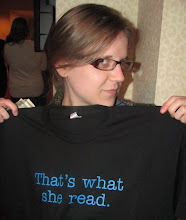I haven't blogged too much this month. And if I may be perfectly honest, t's not because I've been busy with end-of-semester stuff. It's because I've been really down about a lot of things, and everything I wrote sounded whiny. So I just didn't post much.
The political climate in this country is really, really upsetting me. Earlier this month, governor of Michigan Rick Snyder declared the city of Benton Harbor to be in a state of crisis and appointed an "Emergency Financial Manager," who stripped all elected officials in BH of their duties.
Giant democracy fail, I know.
Furthermore, the Detroit Public School System sent layoff notices to every single one of its teachers. We can blame Rick Snyder's budget plan for that, too.
My mom is Canadian. She was born in Sudbury, Ontario, and moved to Detroit when she married my dad (24 years ago yesterday). So I have a lot of relatives in Canada. And one of them--my mom's older sister Kerrie, who lives in the Yukon--offered to let me come live with her for the summer.
I thought it was a pretty neat idea. And not surprisingly, I've been fantasizing about getting out of the US for a while. So Kerrie talked to a friend of hers about getting me a job. I didn't tell too many people about it, because I wasn't sure whether it was going to work out.
And in the end, it didn't work out. I'm oddly not too bummed about that though, because a fear of mine is that a summer in the Yukon would make me lonelier than I already am here in Grosse Pointe.
So, my summer looks like this:
- classes at Wayne State
- babysitting/searching for another job
- the release of Bonnie Jo Campbell's novel _Once Upon a River_ at Kalamazoo's Bell's Brewery in July
- my friend Rose having a baby
- Lollapalooza in Chicago with my friend Toni
But then she followed up with a lengthy FB message, detailing how much it would cost. I appreciated the gesture and really like Toni. Besides, I wanted to go.
So I told autonomous adulthood to suck it, asked my mom to loan me some money, and bought a 3-day pass to Lollapalooza.
I just paid it off a couple of days ago, and will spend the next few months being a huge tightwad in order to be able to afford to spend three days in Chicago. But it will be a fabulous end to the summer. :)
Also: Summer would not be summer without summer reading. Recommendations? Here's a(n unrealistically ambitious) list of books that I'm thinking of reading (in no particular order):
- _Sexing the Cherry_ by Jeanette Winterson
- _The Golden Notebook_ by Doris Lessing
- _Midnight's Children_ by Salman Rushdie
- _Breeding a Nation: Reproductive Slavery, the Thirteenth Amendment, and the Pursuit of Freedom_ by Pamela D. Bridgewater
- _Reading Like a Writer: A Guide for People Who Love Books and For Those who Want to Write Them_ by Francine Prose
- _The Way We Lived_ by Audrey Jacobs
- _When We Were Saints_ by Han Nolan
Anyway. This post has been all over the place. I apologize. They'll soon go back to being more focused. I've decided to participate in a 30-day blog challenge. Let's see how closely I can stick to it.
I'll leave you with a really great NYT article I read last night, which I think sums up everything that matters to me. Virginia Woolf once wrote about what it would have been like if Shakespeare had had a sister. Well, Benjamin Franklin did have a sister. Her name was Jane Mecom. And she didn't do so well.
And this is relevant today because, as the article states:
"Tea Partiers dressed as Benjamin Franklin call for an end to social services for the poor; and the 'Path to Prosperity' urges a return to 'America’s founding ideals of liberty, limited government and equality under the rule of law.' But the story of Jane Mecom is a reminder that, especially for women, escaping poverty has always depended on the opportunity for an education and the ability to control the size of their families."





